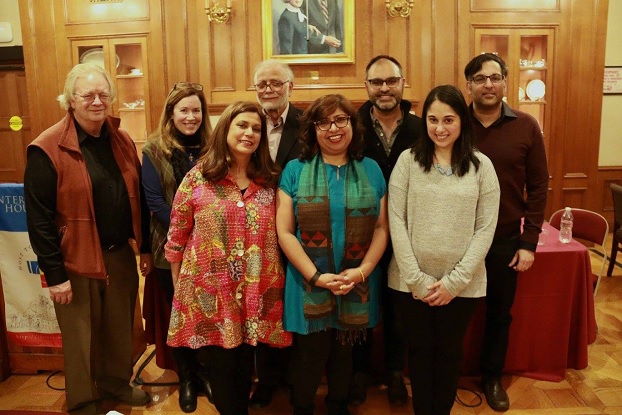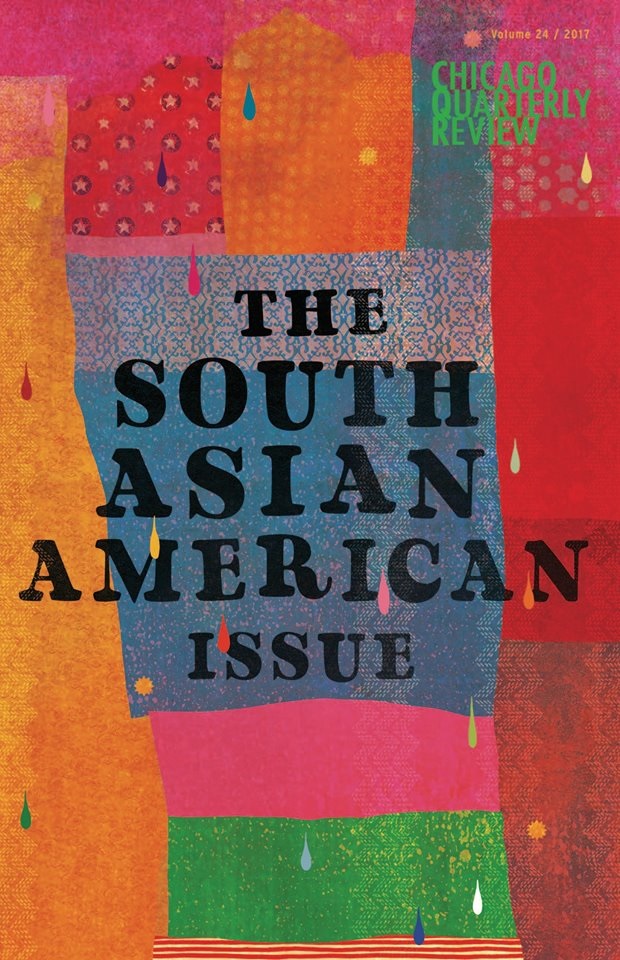
In February 2017, the Chicago Quarterly Review published its South Asian American Issue featuring the work of 38 emerging and established South Asian writers and the April 4 reading was the first public event. There will be more, in San Francisco, LA and Evanston and Chicago and New York, but for this, the first reading, it felt like unwrapping something delicious.
The meeting room in the International House Coulter Lounge at the University of Chicago is hushed and wood-paneled; a large portrait of a Caucasian couple hangs over the fireplace. The sconces could have held candles instead of bulbs a hundred years ago, and the weight of a long history echoes in these chambers. As the evening progressed and people filed into the room, it is filled with the voices of South Asian Chicago writers and the clink of wine; the room seems to take on a multi-hued tapestry of different sounds and colors.
“For this, the first reading, it felt like unwrapping something delicious.”
That Chicago is one of the most diverse and happening cities is no secret (see Adam Morgan’s “Five Reasons Why A Writer Should Move to Chicago”). Among the readers tonight is Toni Nealie, who has edited NewCity and the Rumpus to reflect Chicago’s Midwestern vibe with a strong international presence. There is an easy collegiality to the reading; South Asian writers know each other and many of us have admired and read and supported the work of our contemporaries for years.
 I am among the six Chicago-based South Asian writers who read excerpts from their work; the others are S. Afzal Haidar, Faisal Mohyuddin, Toni Nealie, Ravibala Shenoy (her daughter Lakshmi read on her behalf) and Sachin Waikar. Senior editor of the Chicago Quarterly Review, Elizabeth McKenzie, flew in from California for the event.
I am among the six Chicago-based South Asian writers who read excerpts from their work; the others are S. Afzal Haidar, Faisal Mohyuddin, Toni Nealie, Ravibala Shenoy (her daughter Lakshmi read on her behalf) and Sachin Waikar. Senior editor of the Chicago Quarterly Review, Elizabeth McKenzie, flew in from California for the event.
Moazzam Sheikh in his feisty introduction to the issue writes:
There was a time when the South Asian writer treaded the linguistic register rather carefully…Not anymore! The new South Asian American writer is a wild beast.
Among my favorites: “Five Famous Asian War Photographs“ by Amit Majumdar, a nuanced view of racism and the media from the Afghan Girl on the National Geographic cover to more recent pictures from Abu Ghraib; Soniah Kamal’s glittering “Jelly Beans,” addressing filial piety and assimilation in a love story without affectation; Nadia Chaney’s “There’s Really No Such Thing As the ‘Voiceless,'” where schoolyard bullying in Canada makes the immigrant into a shape-shifting survivor.
“There is no Lahirization of the discourse here.”
There is no Lahirization of the discourse here; this isn’t about migrants with doctorates from the East Coast living in historical houses. Instead, Tara Dorabji’s “Calling the Cops” is a gritty nonfiction piece about living where violence is so commonplace that “…my skin, though Brown, is still light enough to protect me from being shot.”
The six readers that night all challenged the narratives written about us, starting with S. Afzal Haider’s protagonist in “As If,” who replies “No, I’m a cowboy” when asked if he’s Indian. His story is a gentle rumination on ties that bind, to Chicago and elsewhere. Sachin Waikar’s brilliant “The Monkey Man,” delves deep into the minds of thirteen year-old boys in the Midwest coming to terms with a new Korean neighbor, and is astonishing in its racism, fear, and the final unraveling. Toni Nealie writes of her grandfather in New Zealand in “The Dark-Skinned Dispenser of Remedies“ as a way to remedy the wrongs of her mother’s childhood — “The child grows up to protect the mother” — in a luminous discovery and reparation.
“The six readers that night all challenged the narratives written about us.”
Ravibala Shenoy’s “Nimmi’s Choice“ takes on the most cheesy of South Asian tropes –The Arranged Marriage! — in a witty study with a satisfying end. Lost Earring, is much more than the loss of an ornament in Faisal Moyhyuddin’s work, (both his poetry and art is showcased in this issue).
I read a poem on encountering the racism deep within our own hearts in “Descent From The Winter Garden.” CQR editor Gary Houston ended the evening by evocatively reading the late Chicagoan, Ifti Nasim: “A Boy Taught Me How to Kiss A Girl.”
The writers, as the book cover suggests, present a rich tapestry; most are bilingual, and they speak of the influence of Ghalib and Tagore on their own work. Unapologetically honest and without a glossary, this is an important collection of voices which addresses the sociopolitical concerns of our troubled times.
* * *
Dipika Mukherjee has published three works of fiction; her second novel, Shambala Junction, won the Virginia Prize for Fiction in the UK. Her debut novel was longlisted for the Man Asian Literary Prize and republished as Ode to Broken Things and is available in bookstores as well as on Audible. Her short story collection is Rules of Desire.
Editor’s note: Chicago Quarterly Review’s South Asian American Issue features the work of 38 emerging and established South Asian writers. Find links to excerpts from their contributions to the issue shared below, courtesy of CQR’s Facebook page.












